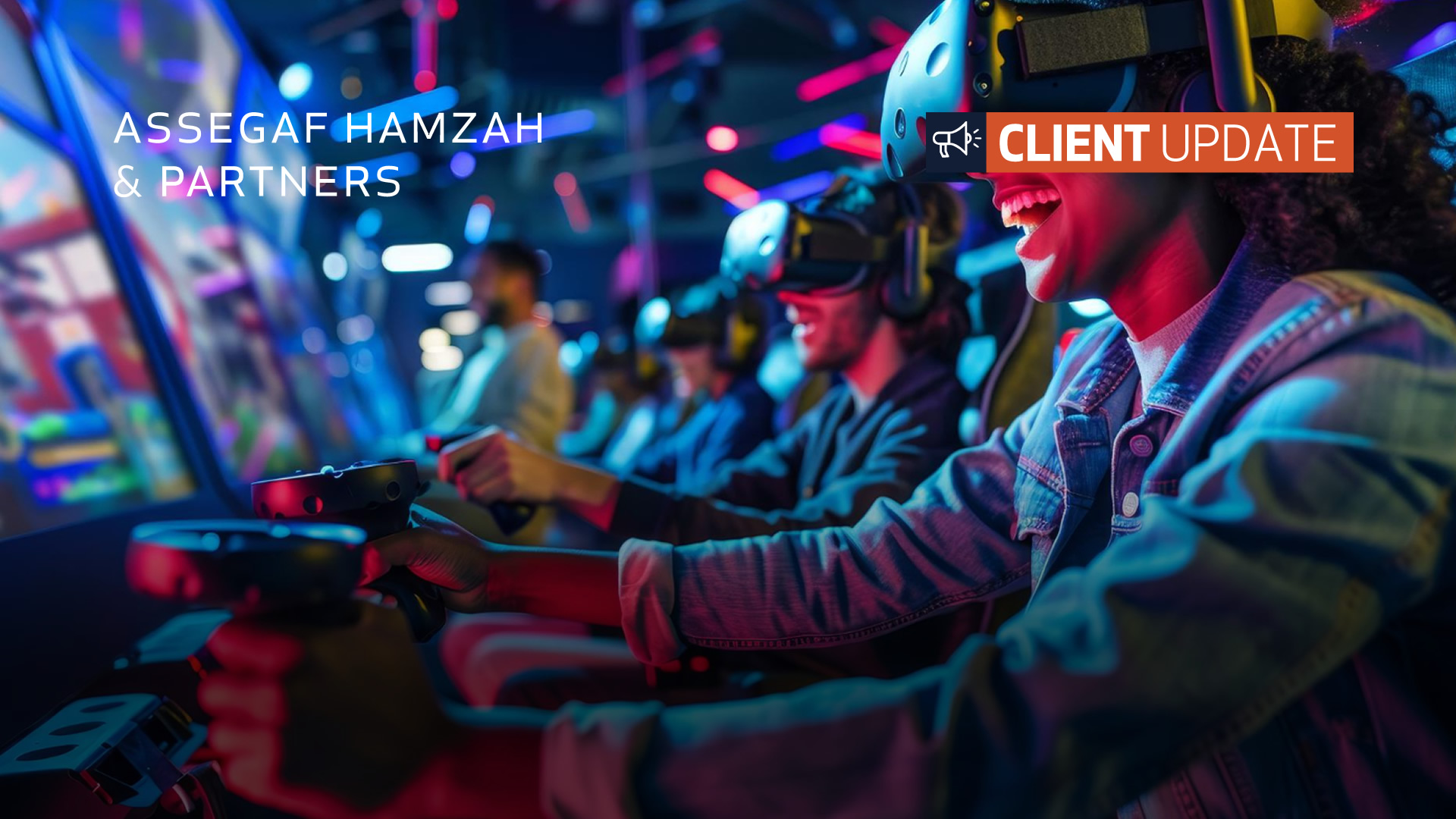Ready, Set, Go! Updates to Indonesia’s Gaming Industry

The Indonesian government enacted two regulations for the gaming industry in early 2024. These regulations, which we will discuss in this alert, put the gaming industry under the spotlight and solidify the government’s commitment in revitalising Indonesia’s gaming industry. The first regulation, Presidential Regulation No. 19 of 2024 on the Accelerated Development of the National Gaming Industry (“Presidential Regulation”) establishes a national development roadmap for the gaming industry. It is quite common for the government to issue regulations on national development roadmap, and in the past, we have seen similar roadmaps for the e-commerce and digital industry. A common theme of these roadmaps is that they address internal and external issues and/or challenges faced by the relevant industry. Meanwhile, the second regulation, Ministry of Communication and Information Technology Regulation No. 2 of 2024 on Game Classification (“Regulation 2/2024”) renews the age classification for games and provides new requirements for game publishers.
As we will see below, the two regulations complement each other and propel Indonesia’s gaming industry to new heights by fostering a dynamic ecosystem where foreign investment and local innovation can converge synergistically.
A National Development Roadmap for the Gaming Industry
The Presidential Regulation sets out seven programs for the gaming industry. These programs consist of detailed and far-reaching activities and targets assigned to seven entities who will be responsible to carry out relevant activities to achieve the targets set in the Presidential Regulation. The entities tasked with these responsibilities are:
The Minister of Manpower;
The Minister of Tourism and Creative Economy/Head of the Tourism and Creative Economy Agency;
The Minister of Finance;
The Minister of Trade;
The Minister of Industry;
Minister of Communication and Information Technology (“MOCIT”); and
The Head of the National Research and Innovation Agency.
Generally, these entities are tasked with developing policies and programs to promote the growth of the nation’s gaming industry and encourage investment by domestic and foreign investors alike. For example, MOCIT is tasked with creating a new business classification (KBLI or Klasifikasi Baku Lapangan Usaha Indonesia)[1] for game publishers to allow foreign game publishers to establish an Indonesian legal entity or a joint venture with a domestic legal entity/company. On the same thread as the creation of this new KBLI, the Minister of Manpower is tasked with developing policies that will simplify the permit requirements for expatriates who are highly competent in the field of game development to work in Indonesia.
On the financial side, the Minister of Tourism and Creative Economy/Head of the Tourism and Creative Economy Agency is tasked to, among others, develop a national gaming industry financing scheme for banks to allow game companies to obtain financing using their intellectual property assets as collateral. This responsibility complements the existing framework on the collateralisation of intellectual property assets (click here and here to read our client alerts on securing intellectual property as collateral). The Minister of Tourism is also tasked with establishing a IDR600 billion (approximately USD40 million) annual Indonesia Game Fund funding scheme, which can fund the development of local games. Game development and game publishing will also be included as pioneer industries and will enjoy corporate income tax facilities.
The remaining responsibilities are generally on the same vein in that they are aimed to foster the growth of the nation’s gaming industry. Besides developing human resources and improving access to financing and capital, the rest of the programs in the roadmap is aimed to increase the promotion and opening of access to the national game market, create an adequate and competitive technology infrastructure to support game developers, and prepare laws and regulations that will strengthen the national gaming industry ecosystem.
An Update to Game Classifications
Before the enactment of Regulation 2/2024, the previous regulatory framework under MOCIT Regulation No. 11 of 2016 on the Classification of Electronic Interactive Games (“Regulation 11/2016”) was fast becoming obsolete due to the rapid development in the game industry. Consequently, many aspects of the industry, such as business licensing and marketing requirements, were not regulated for a period because of this gap in the legislation.
A key change introduced by Regulation 2/2024 is the requirement for game publishers (which are defined as parties that market game products), both local and foreign, to register themselves as a private electronic system operator (Penyelenggara Sistem Elektronik Lingkup Privat or PSE Lingkup Privat) through the Online Single Submission (OSS) system. After registration, a game publisher must independently classify their games before it can advertise and promote the games in Indonesia. This self-assessment can be done either through the MOCIT’s official website or any electronic systems connected to the MOCIT’s website (e.g., igrs.id).
Based on the self-assessment, the MOCIT will conduct a suitability test of the self-assessment and classify the game. Then, the game publisher can start advertising and promoting their game. In doing so, the game publisher must ensure that:
The MOCIT’s classification is included in the game’s description, packaging, and advertising;
The publisher (if required) has adjusted the game’s packaging or advertising based on the game’s classification;
The packaging and advertising for games classified as 3 years old or above and 7 years old or above are marked with “to be accompanied by parents” sign; and
The packaging and advertising for games classified as 13 years old or above and 15 years old or above are marked with “parental guidance” sign.
With respect to age groups, Regulation 2/2024 removes the ‘all ages’ group due to overlap in criteria with the ‘7 years old or above’ age group. Additionally, it introduces a new age group of ’15 years old and above’, aligning the age classification more closely with that of the Pan European Game Information (PEGI), as follows:
|
Age Group under Regulation 11/2016 |
Age Group under Regulation 2/2024 |
| 3 years old or above | 3 years old or above |
| 7 years old or above | 7 years old or above |
| 13 years old or above | 13 years old or above |
| 18 years old or above | 15 years old or above |
| Suitable for all ages | 18 years old or above |
The foregoing amendment ties in with the types of contents that can be displayed in games, which have also been amended in Regulation 2/2024. All in all, there are three types of contents that are generally prohibited and make the game unclassifiable, which are:
display of video and/or audio of pornography;
the game’s activity is based on mere luck or involves gambling that can use legal payment methods, foreign currency, electronic money, or intangible commodities in the form of digital assets that can be traded and exchanged into legal payment methods and provides/supports/facilitates the disbursement feature; and/or
there are contents that violate other laws and regulations.
Administrative Sanctions May Apply
Another salient point in Regulation 2/2024 is the introduction of administrative sanctions for certain violations. The authority that can impose these sanctions is the MOCIT, and as seen below, the administrative sanctions are quite wide-ranging. For example, failure to include the result of the MOCIT’s classification in the game’s description, packaging, and/or advertising may lead to the issuance of a written reprimand, temporary suspension, or termination of access for Indonesian users to the game, similar to actions that MOCIT may take in blocking unregistered electronic system operators.
MOCIT may also terminate access of Indonesian users to the game if the game publisher failed to self-assess their games before advertising it, advertised unclassified games, or failed to reclassify their games upon request by the MOCIT. Regulation 2/2024 also allows administrative sanctions to be imposed for failure of a game publisher to register as a private electronic system operator or PSE Lingkup Privat.
Key Takeaways
The Presidential Regulation embodies the dynamic and ever-evolving nature of the gaming industry, aiming to stimulate domestic and foreign investments and participation in Indonesia’s gaming sector. Meanwhile, Regulation 2/2024 overhauled the game classification process by introducing updated age groups and a more streamlined, business-friendly mechanism. With these regulations in place and a clear roadmap of the government’s intentions for the gaming industry, both local and foreign businesses can expect further support from the government in developing games in Indonesia.
If you have any queries on the above, please feel free to contact our team members below who will be happy to assist.
[1] All business sectors in Indonesia have their own KBLI codes.
I Made Diyosena Bratadana also contributed to this alert.


